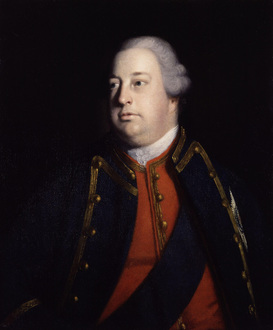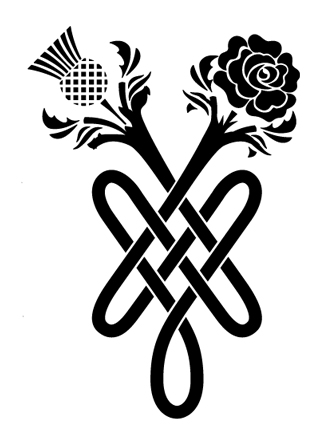
Prince William Augustus was born on April 26, 1721 in Leicester House in London during the reign of his grandfather King George I. He was the first member of the House of Hanover to be born in England. His father was the future King George II and his mother was Caroline of Ansbach.
At the age of four he was created Duke of Cumberland, Marquess of Berkhampstead, Earl of Kennington, Viscount Trematon and Baron Alderney.
At the age of 19, Cumberland joined the Royal Navy, but in 1742 he transferred to the Army, becoming a Major General in December of that year at the age of 21. In 1743 he saw active service in the middle east, then on 27 June 1743 fought alongside his father at the Battle of Dettingen in Germany. Cumberland was wounded, but considered a hero at home, and promoted to Lieutenant General.
On 11 May 1745, at the age of 24, Cumberland was Commander-in-Chief of the allied British, Hanoverian, Austrian and Dutch troops when he led his troops to a valiant defeat at the Battle of Fontenoy. When Bonnie Prince Charlie marched into England at the head of his Jacobite Army in November 1745, evading Field Marshal Wade's forces and reaching Derby, Cumberland was recalled to England to take charge of all forces in Britain. He hotly pursued the Jacobite Army back to the Scottish border, but then returned south to ensure the coast of England was safeguarded against French attack. He left the pursuit of the Jacobites to Lieutenant General Hawley.
When Hawley was beaten by the Jacobites at the Battle of Falkirk Muir on 17 January 1746, Cumberland headed north, arriving in Edinburgh on 30 January. Cumberland took the time to make sure his troops were trained to withstand the famous highland charge. When the two armies met on 16 April, the outcome was a decisive victory for Cumberland.
Cumberland, however, was interested in more than winning a battle. He wanted to ensure that the long series of Jacobite uprisings in Scotland would be brought to an end, once and for all. In the aftermath of the battle, Cumberland's troops committed widespread atrocities, killing many wounded, surrendering and fleeting Jacobites, as well as bystanders and local residents. Cumberland’s infamous order that there was to be ‘no quarter’ for the Jacobites was ruthlessly interpreted by his men.
Worse was to come. Bonnie Prince Charlie might have escaped but Cumberland took his revenge on those left behind. He established his headquarters at Fort Augustus, which had been named after him during his childhood. From there he sent out columns of troops backed by ships of the Royal Navy to commit genocide across the Jacobite areas of the Highlands. Cumberland even considered shipping the entire population of these areas to the colonies. In the end he satisfied himself with burning farmsteads, crofts and houses. Widespread murder and rape ensued. On Cumberland’s orders 20,000 head of cattle were sent south, effectively wiping out the entire economy of the Highlands. Cumberland also went about dismantling Highland culture by disarming the clans, banning the wearing of Highland dress, suppressing certain surnames and the use of the Gaelic language. This amounted to an early example of ethnic cleansing. Prince William Augustus came to be known in the Highlands as Butcher Cumberland.
But in the Lowlands it was a very different story. The Glasgow Journal produced a special commemorative edition after Culloden in which they recorded ‘the greatest rejoicings that have been known in the city’. Most Lowland Scots had little love for the Jacobites, and even less sympathy for those in the Highlands who had become involved in Bonnie Prince Charlie's cause.
Back in England, Cumberland was honoured with a special anthem composed in his honour by Handel entitled ‘See the conqu'ring hero comes’. He was known as Sweet William in honour of his successes. Despite this, Culloden and its brutal aftermath did affect Cumberland's public image south of the border, and the taunt of ‘Butcher Cumberland’ was whispered even in London. It is significant that no British Army regiment has ever included Culloden among its battle honours.
Things deteriorated for Cumberland when, in 1757, he was placed in command of British and allied forces defending Hanover from French attack during the Seven Years' War. It was a major humiliation for his dynasty when he failed. George II refused to be bound by Cumberland's agreement to evacuate Hanover, and a disgraced Cumberland resigned from all public office.
Cumberland died in London in 1765, aged 44, unmarried and childless.
At the age of four he was created Duke of Cumberland, Marquess of Berkhampstead, Earl of Kennington, Viscount Trematon and Baron Alderney.
At the age of 19, Cumberland joined the Royal Navy, but in 1742 he transferred to the Army, becoming a Major General in December of that year at the age of 21. In 1743 he saw active service in the middle east, then on 27 June 1743 fought alongside his father at the Battle of Dettingen in Germany. Cumberland was wounded, but considered a hero at home, and promoted to Lieutenant General.
On 11 May 1745, at the age of 24, Cumberland was Commander-in-Chief of the allied British, Hanoverian, Austrian and Dutch troops when he led his troops to a valiant defeat at the Battle of Fontenoy. When Bonnie Prince Charlie marched into England at the head of his Jacobite Army in November 1745, evading Field Marshal Wade's forces and reaching Derby, Cumberland was recalled to England to take charge of all forces in Britain. He hotly pursued the Jacobite Army back to the Scottish border, but then returned south to ensure the coast of England was safeguarded against French attack. He left the pursuit of the Jacobites to Lieutenant General Hawley.
When Hawley was beaten by the Jacobites at the Battle of Falkirk Muir on 17 January 1746, Cumberland headed north, arriving in Edinburgh on 30 January. Cumberland took the time to make sure his troops were trained to withstand the famous highland charge. When the two armies met on 16 April, the outcome was a decisive victory for Cumberland.
Cumberland, however, was interested in more than winning a battle. He wanted to ensure that the long series of Jacobite uprisings in Scotland would be brought to an end, once and for all. In the aftermath of the battle, Cumberland's troops committed widespread atrocities, killing many wounded, surrendering and fleeting Jacobites, as well as bystanders and local residents. Cumberland’s infamous order that there was to be ‘no quarter’ for the Jacobites was ruthlessly interpreted by his men.
Worse was to come. Bonnie Prince Charlie might have escaped but Cumberland took his revenge on those left behind. He established his headquarters at Fort Augustus, which had been named after him during his childhood. From there he sent out columns of troops backed by ships of the Royal Navy to commit genocide across the Jacobite areas of the Highlands. Cumberland even considered shipping the entire population of these areas to the colonies. In the end he satisfied himself with burning farmsteads, crofts and houses. Widespread murder and rape ensued. On Cumberland’s orders 20,000 head of cattle were sent south, effectively wiping out the entire economy of the Highlands. Cumberland also went about dismantling Highland culture by disarming the clans, banning the wearing of Highland dress, suppressing certain surnames and the use of the Gaelic language. This amounted to an early example of ethnic cleansing. Prince William Augustus came to be known in the Highlands as Butcher Cumberland.
But in the Lowlands it was a very different story. The Glasgow Journal produced a special commemorative edition after Culloden in which they recorded ‘the greatest rejoicings that have been known in the city’. Most Lowland Scots had little love for the Jacobites, and even less sympathy for those in the Highlands who had become involved in Bonnie Prince Charlie's cause.
Back in England, Cumberland was honoured with a special anthem composed in his honour by Handel entitled ‘See the conqu'ring hero comes’. He was known as Sweet William in honour of his successes. Despite this, Culloden and its brutal aftermath did affect Cumberland's public image south of the border, and the taunt of ‘Butcher Cumberland’ was whispered even in London. It is significant that no British Army regiment has ever included Culloden among its battle honours.
Things deteriorated for Cumberland when, in 1757, he was placed in command of British and allied forces defending Hanover from French attack during the Seven Years' War. It was a major humiliation for his dynasty when he failed. George II refused to be bound by Cumberland's agreement to evacuate Hanover, and a disgraced Cumberland resigned from all public office.
Cumberland died in London in 1765, aged 44, unmarried and childless.





 RSS Feed
RSS Feed